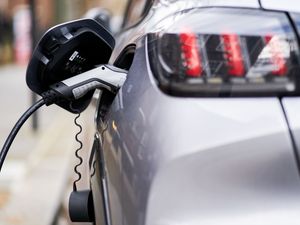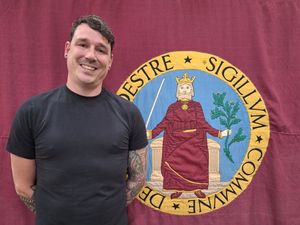Will Brexit mean the end of Eldorado for Shropshire expats?
The now infamous television series Eldorado portrayed the life of the British expat in Spain as a somewhat glamorous affair. Wealthy, handsome men with pin-up wives sipping cocktails by the pool as they basked in never-ending, all-year round sunshine.
For Penelope Middleton Darby, though, the reality now looks somewhat different. The former Shropshire office worker, who emigrated to a village just outside the Spanish city of Murcia in 2011, is now anxiously waiting to find how she and her husband Simon will be affected by Britain's decision to leave the EU.
The precise number of Britons living in Spain is a matter for some debate. In 2014, the official number of registered British migrants in the country was just over 300,000, but it is widely acknowledged that this is only the tip of the iceberg. The left-leaning Institute of Public Policy Research has estimated that the number might be as high as 760,000.
Mrs Middleton Darby, who raised her family in Ellesmere, and whose brother Dr Paul Middleton worked until recently as a GP in Oswestry, is not expecting to be expelled from the country. But she says the economic situation could force her and her husband to return to Britain.
"We have been resident in Spain for over five years, so we expect to be allowed to stay but, of course, if the UK leaves with no deal not even that is guaranteed," she says.
Mrs Middleton Darby, who is 66, and her 71-year-old husband, are typical of many of the Britons who retired to Spain for the warmer weather and quieter lifestyle.
"There were many reasons for leaving, a prime one being health," says Mrs Middleton Darby, who worked for accountancy firm Morris Cook & Co.
"We both have arthritis in our families and a drier, warmer climate gives us a much healthier life.
"We also have a much better quality of life, our pensions are not generous and, although we find ourselves struggling a little as sterling has fallen so much, we are still better off in Spain. It's a quieter life, less stress, noise and bustle, all of which suits us. We find the health service in Spain excellent too."
But she fears that unless the UK Government can secure a favourable deal with the Spanish authorities, the dream could rapidly turn into a nightmare, and she and her husband could be forced to return to the UK.
She is a member of the recently formed Bremain in Spain pressure group, which is campaigning for British expats now living in Spain.
"Our main concern is continuing healthcare," says Mrs Middleton Darby.
"Without UK continuing to pay Spain for our healthcare we will, along with many other pensioners, will be forced to return to UK."
She also has concerns about the impact the fall in sterling has had on the value of their pensions. She says even if British pensions are subject to annual rises, it is unlikely to compensate for the weak pound.
"Our UK pension has shrunk over 25 per cent," she says. "Unless the UK manages the economy better, sterling become worthless and our living standard in Europe falls. If it falls much further we will not be able to afford to stay."
Mrs Middleton Darby says it is a worrying time for many expats who moved to mainland Europe, as well as for citizens of other EU countries who moved to the UK. She is critical of the UK Government's handling of the negotiations, saying it should have guaranteed the rights of existing EU immigrants at the outset.
"The whole situation has caused a lot of upset, worry and stress," she says.
"We pensioners did not deserve this, just as EU citizens in the UK don't either, it's disgraceful.
"There is no excuse for the UK not guaranteeing citizens' rights from the start and the payment for healthcare is solely to be agreed by the UK Government. Citizens' rights should gave been agreed quickly and ring-fenced."
The Bremain in Spain group is unashamedly in favour of Britain remaining in the EU, despite last year's referendum result, and is now calling for the EU to offer European passports to British expats once the UK has left the EU.
Mrs Middleton Darby is firmly against Brexit: "I believe untangling 40 years of ever closer co- operation with our neighbours is impossible, destructive of peace in Europe, likely to lead to the breakup of the UK, very expensive to try and achieve in a country already burdened with massive debt."
These arguments will struggle to find much support in Shropshire, a county which voted overwhelmingly to leave the European Union. In the Shropshire Council area, 57 per cent voted to leave the EU, with the figure rising to 63 per cent in Telford & Wrekin, and Mrs Middleton Darby's old North Shropshire constituency this year returned arch eurosceptic Owen Paterson to Parliament with a massive 16,000 majority.
But Mrs Middleton Darby believes many of the fears about immigration controls could easily have been addressed had Britain remained in the EU. And she believes that many who voted Leave in the belief that it will reduce immigration are likely to be disappointed.
"UK could easily enforce EU rules to control immigration and leaving will lead to more non EU migration because it will be a condition of trade deals," she says.
"In short Brexit will be a disaster for the UK and its people, unless you are very rich and wanting to use a tax shelter."
She also warns that if people like her are forced to return to Britain, there could be added costs which will put more pressure on the British taxpayer.
"If we do that we will claim many benefits that we cannot claim here. It would be difficult, our little house in a Spanish village in Murcia will be very hard to sell.
"Even if we could sell the proceeds would not be enough even to buy an apartment in UK near family."
As the negotiations drag on, and the departure date draws closer, opinions on both sides are only likely to harden, and the tensions grow.
The one thing that most people probably agree on is that a mutually beneficial deal cannot come a moment too soon.





